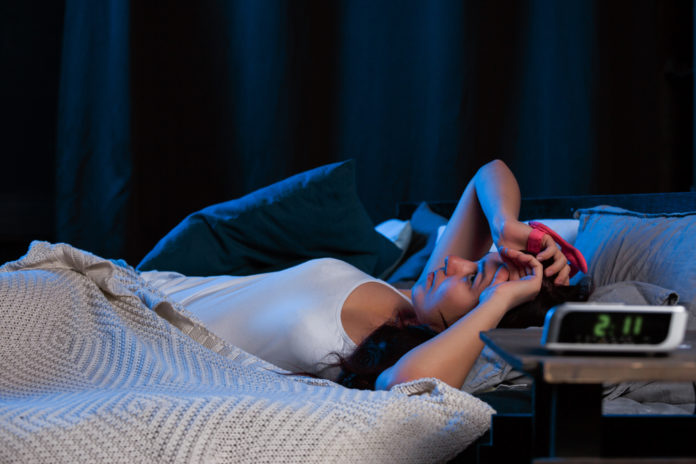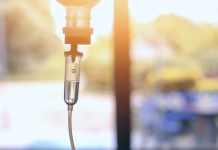Why You Might Be Waking Up
(And How to Sleep Through the Night)
1. Too Much Screen Time
Televisions, phones, and tablets cannot only be distracting for hours on end and into the night, but inhibit the natural sleep cycle caused by their emitting blue light, which influences sleep patterns by regulating the body’s natural sleep and wake cycle.
What to Do About It:
Instead of laying in bed and scrolling through the social media feeds or catching up on the latest television series, quiet the mind by powering down all electronics leading up to bedtime.
Switching over to the “Night Shift” setting and dimming the light on your phone or reading tablet can also be helpful in influencing healthy sleep-wake cycles.
2. Stress
Whether stemming from a 10-page paper deadline or manifesting from a challenging work project, feeling stressed can make it difficult to relax and rob us from a good night’s rest.
What to Do About It:
Partake in electronic-free relaxation techniques leading up to bedtime, as doing so relieve stress and ease the process of falling asleep. Calling a friend, writing in a journal, taking a warm bath, reading a book, and stretching exercises are just a few ways to wind down and relax the mind.
3. The Bathroom Is Calling
While you might be answering to the comfort of your bed, sometimes the bathroom might be calling and you have to pick up…
What to Do About It:
Try limiting fluid consumption a few hours leading up to bedtime. But if you feel thirsty before bed, allow yourself a few sips of water or try noshing on a cold piece of fruit.
Furthermore, confine caffeine for the morning, as drinking caffeinated products such as coffee, soft drinks, energy drinks, and tea can disrupt an efficient sleep cycle come bedtime.
4. That Glass of Wine
While that nightcap may help you fall asleep related to its sedative effective, it may likewise disrupt a restful night’s sleep and be doing more harm than good.
After it is metabolized within the first half of your sleep cycle, the latter is likely to be restless and fragmented (and might be interrupted with a bathroom break)!
What to Do About It:
Perhaps you should take it easy on the alcohol and quit drinking a few hours before you go to bed. This will give the body more time to rid the alcohol before trying to fall asleep.
And ultimately, if you do choose to drink, men should stick to two servings of alcohol daily while women are limited to one.
5. Certain Health Conditions
There are a number of health conditions that may make it difficult to get comfortable and disrupt sleep, including the following:
- Sleep Apnea
Sleep apnea is a common, yet serious sleep disorder that causes breathing to become shallow or completely stop during sleep. As a result, sleep is likely extremely fragmented and likely to be poor.
- Restless Leg Syndrome
Restless leg syndrome (RLS) a condition in which the nervous system causes an impulse of leg movements. And while sleep can be beneficial to relieve RLS symptoms, uncomfortable itching or the feelings of pins and needles in the legs may be waking you up in the middle of the night and interrupting sound sleep.
- Eczema
Eczema is a general term describing rash-like, inflammatory conditions of the skin. The irritating skin condition can jeopardize your sleep, especially since itching tends to worsen in the evening.
What to Do About It:
If you suspect a health condition is impeding on your sleep, it is a good idea to discuss treatment options with your doctor. And despite the underlying health condition, confront and treat it, as successively doing so can lead to a greater night’s rest!
Certain medications may also have a negative impact on sleep cycles, so check with your pharmacist or primary care provider to verify their side effects and how you can manage them.
6. Ill Room Temperatures
Feeling too hot may not only make it hard to fall asleep, but stay asleep. And not to mention, less-than-ideal room temperatures can negatively impact the quality of REM sleep, or the stage of sleep in which dreaming occurs.
What to Do About It:
According to the National Sleep Foundation, and the one simple tip to make you a morning person, anywhere between 60° to 67°F is optimal for the body’s natural sleep and wake cycle.
7. Uncomfortable Mattress and Pillow
The story of Goldilocks and the Three Bears speaks to an uncomfortable bed all too well… “She lay down in the first bed, but it was too hard. Then she lay in the second bed, but it was too soft.”
What to Do About It:
And as the story luckily continues, “Then she lay down in the third bed and it was just right!” But what made it “just right?” The mattress was likely comfortable, yet supportive!
You should also switch out your mattress approximately every 10 years, along with swapping pillows out every one to two years to ensure your head and neck gets the support it needs.
8. Sleeping with A Pet
You and your four-legged companion start your day together with a morning walk and end it with bedtime snuggles. Unfortunately, the latter might be impeding on your sleep… In fact, research published in the Mayo Clinic Proceedings found human sleep efficiency was lower if the dog was on the bed as opposed to simply in the room.
What to Do About It:
While kicking out Fido is not exactly necessary, perhaps try having him sleep off the bed in a designated area if you can’t sleep through the night.









